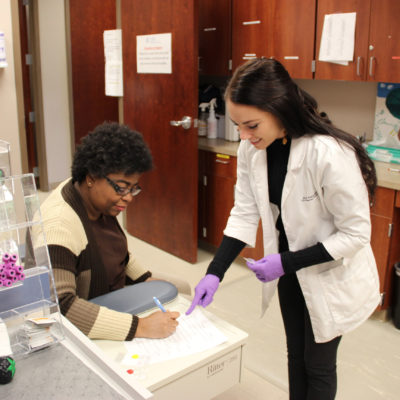We’re pleased to repost this story from the Salisbury Post highlighting the importance of clinical studies by the NRI and our colleagues on the North Carolina Research Campus. Friends and neighbors are invited to join in any of the studies currently in progress across the campus by checking the Participate page at our website or the Clinical Research Studies page on the campus’s website.
One may not notice at first glance, but work is being done that could preserve the health of local residents for generations into the future everyday in Downtown Kannapolis.
The North Carolina Research Campus has hosted clinical studies for years since opening in the community, bringing researchers from esteemed institutions such as Appalachian, N.C. A&T and N.C. State.
One program that is reaching out for more participants around the area is the UNC Chapel Hill Nutrition Research Institute. The program’s Vorguanti Lab has been conducting a Children’s Health Study out of its facility in Kannapolis since 2017.
The study is for young people ages 5-19 and is focused on identifying genes and lifestyle factors that affect the health status and overall well-being of these younger generations.
According to Brea Nance, a researcher with the institution, the study is completely voluntary and children who do participate only are asked to return intermittently to follow-up on their own health and lifestyle factors.
Nance explained that while drawing blood may be the “toughest part” of the study for some of the participants, the benefits of the “wide-ranging results” that could come from these studies will have long-term impacts for how health is studied on a longitudinal basis along the lifespan.
At another location on the NCRC grounds, researchers for the Duke University Clinical and Translational Science Institute are assisting in clinical studies of their own on other aspects of the lifespan.
The Preventable Study, for example, is a nationwide initiative with Kannapolis researchers focusing specifically on the efficacy of taking a statin on dementia prevention among adults 75 and older.
About one in three people in the U.S. over age 75 without heart disease take statins. Now, Duke researchers are working tirelessly to see if that number should increase moving forward.
“Very few people start a statin after age 75 because we don’t have any proof that this drug improves the health of older adults,” said Dr. Karen Alexander, a Duke cardiologist in Durham and lead scientist for the study.
“Results from Preventable will provide that evidence and help us understand if it makes sense to start a statin after the age of 75 to prevent dementia.”
Other programs such as Promote (focused on improving insulin sensitivity in people with Type 2 diabetes) and Transitions (addressing lower-back pain) are also being researched through Duke’s on-site presence at the campus.
All of these programs, regardless of which institute sponsors them, are open for public participation for those who qualify. Many of the programs offer a monetary form of payment for participants as well.
Regardless of the compensation, contributions of those who participate in these programs will not only protect their own health moving forward but that of the community as a whole.
For more information about these clinical studies and many others offered through NCRC, those interested are asked to visit the catalog online at or to call 704-938-5400.

